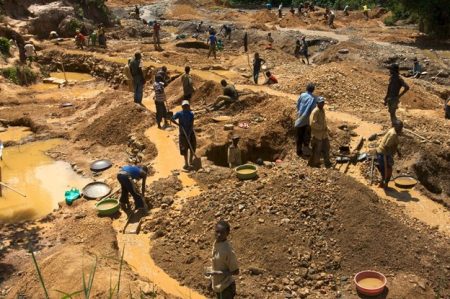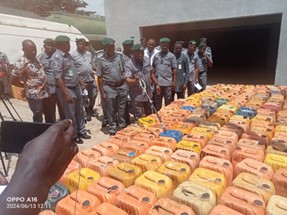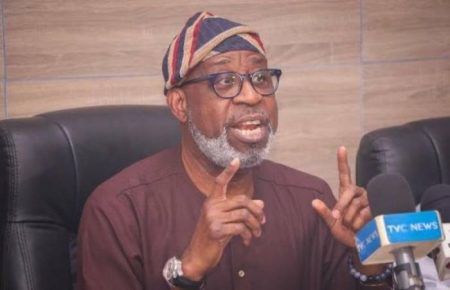 13 May 2013, Abuja – In spite of the massive potentials of the solid minerals sector in the country, it contributes only marginally to the nation’s Gross Domestic Product, GDP, due to an incoherent policy framework and lack of political will. The President of the Progressive Miners Association of Nigeria, Mr. Sunny Ekosin, in this interview, says that the nation can earn over a trillion naira and create two million jobs between now and 2015 if President Jonathan sets up a Presidential Committee on Solid Minerals to give the sector a push.
13 May 2013, Abuja – In spite of the massive potentials of the solid minerals sector in the country, it contributes only marginally to the nation’s Gross Domestic Product, GDP, due to an incoherent policy framework and lack of political will. The President of the Progressive Miners Association of Nigeria, Mr. Sunny Ekosin, in this interview, says that the nation can earn over a trillion naira and create two million jobs between now and 2015 if President Jonathan sets up a Presidential Committee on Solid Minerals to give the sector a push.
Excerpts:
What is your assessment of the Nigerian Solid Minerals sector in terms of its current contribution to the Gross Domestic Product (GDP) and its real potentials?
I have been in this sector for well over two decades and I have been in the leadership seat of the Miners Association in Nigeria for almost 10 years. Ghana, which is a neighbouring country has been able to harness its resources which is about 30 per cent of Nigeria’s mineral wealth.
The sector currently contributes just 0.3 per cent of the GDP. This comes mainly from the sale of papers in the name of mining licences. As we speak, about 7,000 mining licences have been issued to by the Federal Government. Sadly, less than one per cent of those mining licences are being used in the country or what you can call operational mines in the country.
We are in a very sad scenario and because of this, as operators, we have made a lot of presentations to the Federal Government on how to untie this great sector with huge revenue potentials for the nation, one of the initiatives we originated and developed was the Road Map on mining.
We developed this last year and submitted it to the Federal Government and fortunately, the ministry that was supposed to buy into it did and was compelled by the presidency to do so and the road map was presented at the Federal Executive Council meeting and it was adopted.
We have also developed a second major critical document which is now at the disposal of the presidency and the Ministry of Mines and Steel. We have also widely circulated it among inter-related ministries like Finance, Trade and Investment, as well as Science and Technology.
We coordinate with mining module projects. It’s a massive approach to developing mineral endowments in the country. In that document, we noted that at least 95 per cent of those currently involved in any act of mining whether legal or illegal in the country, are basically what we call small, artisanal miners which are purely indigenous with no mechanized mines.
If there were to be any mechanized mines at the exploration stage, we can generously give to them at two per cent of the actual mining operation taking place in this companies in the country. This is the sad situation right now. As operators, we are concerned and we have been crying and drumming this into government’s ear all along with appeals and apparent positions to both the presidency and the National Assembly, but we seem to be so unfortunate with this seventh Assembly. It appears they are comatose. In spite of all we have presented to them, we are not seeing moves as true representatives of the people that we hope to see.
There have been arguments that mining can effectively check the current rate of unemployment and insecurity in the country? How true is that argument from your knowledge of the industry?
When we looked critically at the problems of Boko Haram, we felt that we needed to rescue this nation. Of the 95 per cent small and artisanal miners, 90 per cent of them are resident in the north. If you can harness the potential of this labour force, of the youth that are involved in all these atrocities of killing and maiming innocent people and the destruction of properties, into productive use, I think the so-called Boko Haram insurgency will come to an end because by and large, whether we like it or not, the truth must be told that the driving force for insurgency and militancy, national insubordination and social vices, is most times economic problems, unemployment.
If we can use the potentials of these youths in the north who are well vast in the art of mining, I think we will reduce insurgency to a minimal level. We have the figures to prove this because when tin mining began in Nigeria in 1903- 1904 in Jos, it was the northerners that were the first miners before people from the south migrated to Jos to begin mining. We believe that mining is an antidote to all of these insurgencies that are taking place particularly across the north of the country.
What specific actions can the Federal Government take to give the solid minerals sector the push that it requires to make the expected contribution to the nation’s economy?
Our appeal is basically to Mr. President to set up a Standing Presidential Committee otherwise we would just be dumping N15 billion annually as budget to the Ministry of Mines and Steel with nothing to contribute to the nation or to the sector. So if the sector must contribute to the national GDP, for us as operators, we said two million jobs can be created. The generation of employment thus far, since the establishment in 1995 of the ministry, is less than 300,000 so what are we talking about?
We just need the political will and the patriotic drive to really harness these huge potentials. It is too massive and time will fail me to give you statistics. For example, coal mining alone in China is generating five million direct jobs annually because they have massive large skilled operators producing about 30,000 metric tons. Nobody seems to be talking about the massive coal deposit we have in the country.
As we speak, not a single coal mine is operational currently in country. The question is why not? All you need is to have a Presidential Committee consisting of people with passion for solid minerals development and patriotism to drive the sector. Nigeria imports fertilizers on a massive scale. Why should a country with large deposits of limestone import fertilizers? We have large deposits of limestone across the country.



